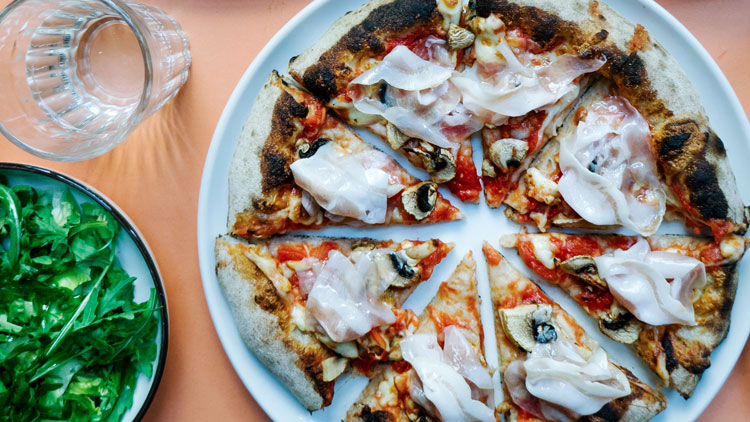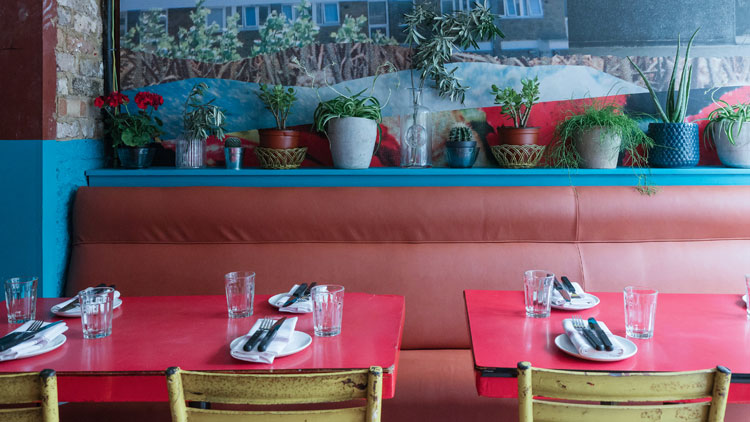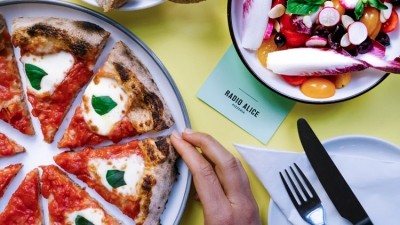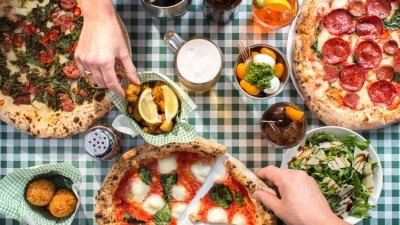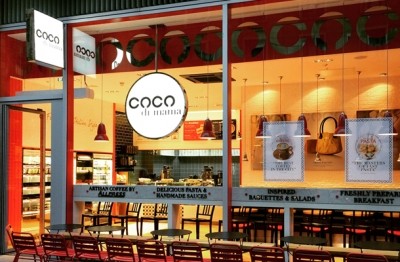Radio Alice: the pirates of pizza
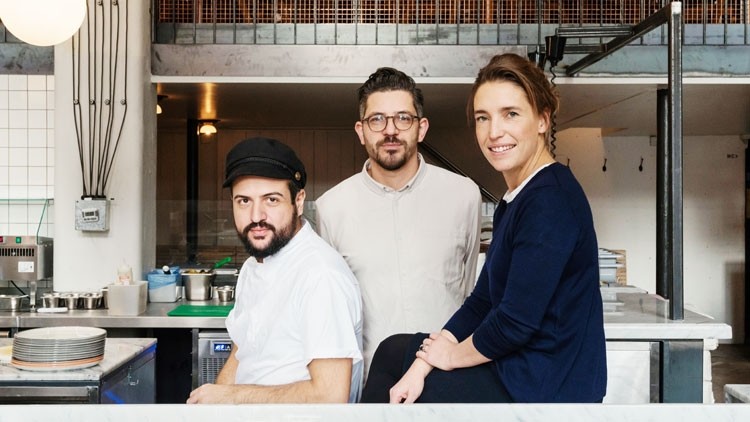
The duo behind the nine-strong Italian pizza restaurant group Berberè have made a number of trips to London over the years with learnings taken back to their growing business in Italy. “Two times a year we come over to have a look around,” says Matteo.
“I remember the first time we went to Byron, it was an inspiration. It had entered the quite average burger market with a different look and feel and had great attention to detail. In Italy, we were also looking for a contemporary touch in a tired market.”
Indeed, according to the brothers, while Italy is home to at least 60,000 pizzerias, back in 2009-2010 when they were considering launching their own version “no one was talking about quality pizzas,” says Salvatore. “There was a big movement in fine dining and with Italy’s trattorias, but not pizzerias, which was so strange to us. Italy is full of pizzerias, but most of them are low quality and follow tired old stereotypes.”
It’s a statement to make some of Naples’ most renowned pizzerias throw their San Marzano tomatoes in anger, but the brothers are steadfast in their views. Rossopomodoro notwithstanding, the pair believe that in 2010, when they founded Berberè in Bologna, their home country lacked a credible casual-dining pizza brand that appealed to a younger, more demanding customer.
“The restaurant sector is one of the biggest industries in Italy but the majority [of restaurants] are still family businesses and are not so professional – yes fine dining restaurants are, but not casual dining,” says Salvatore.
"After Grace Dent reviewed us it made us
understand better this country's different tastes"
A slice of the action
The brothers mention this over lunch at Radio Alice – or ali-chay, as it is pronounced in their home country – alongside Radio Alice managing director Emma King. Named after a pirate radio station based in Bologna that busied the airwaves in the 1970s, the two-strong Radio Alice restaurant group is the UK incarnation of Berberè that first opened in Hoxton in late 2016 in a joint partnership with Ask Italian and Zizzi owner Azzurri – a second opened in Clapham the following June.
The brothers met Azzurri chairman Harvey Smyth back in 2015, when he visited their restaurant in Bologna, and left a lasting impression on him. So when King, who he knew from before her days as co-founder of bakery group Gail’s when she first moved to the UK from Australia (his wife is Australian), approached Smyth with an idea, he had a solution.
“I was at Gail’s for 10 years and when I left I was thinking about what was going on in different sectors,” says King. “Coffee had gone though a massive improvement, as had bakeries and burgers, but I saw the pizza market as quite static.
"There had been a couple of new entrants, but I still felt like I hadn’t had the pizza I wanted. I got in touch with Harvey and asked him why no one was doing it and he told me to come and meet these guys,” she says, gesturing at the brothers.
Following the meeting, a joint venture between the brothers and Azzurri was formed to create Radio Alice (Azzurri has no stake in Berberè). “It’s not part of Azzurri, we are just an investor,” says King. The intention had been to simply recreate Berberè in the capital, but the time it took to explain how to pronounce the brand was an indication it wasn’t the best choice, the brothers admit.
They settled on Radio Alice, not just because of its more UK-friendly moniker, but because they had an affinity with the pirate radio station, albeit a vicarious one.
“We liked the idea of it because it was a new way of communication,” says Salvatore. “We were born in Calabria but grew up with this idea of Bologna during the 70s because our aunt was studying there and came home and spoke of the pirate radio station there. Our other little passion is music; we have a web radio that plays across all our restaurants, so Radio Alice worked for us.”
Growth of the brand
So what did Smyth, along with King and Azzurri CEO Steve Holmes, see in Berberè that convinced them it could work over here? It was a combination of good quality pizzas and a strong brand that targeted a demographic that ASK Italian and Zizzi wasn’t reaching out to. In Berberè, Azzurri has seen the potential in a similar fashion to how Gondola regarded Byron in the early days of the burger brand.
The first Berberè opened in a small village close to Bologna, with 39-year-old Salvatore having previously worked in retail. The first six months were a struggle. “We were in a little mall,” says Salvatore. “We didn’t have any money to pay premiums in a city centre.” However, thanks to a good review in a local newspaper, momentum grew.
Three years later the brothers opened a second restaurant in the city, followed by a third in Florence – the high-speed train line dictating where they went next (“Bolgana to Florence is half an hour by train, it’s quicker than Hoxton to Clapham”) – with a fourth opening in Milan. Today, it also has restaurants in Rome, Verona and Turin, with Florence its smallest restaurant (average size is around 70 covers, Hoxton has 90).
As well as their more millennial-friendly style, the brothers believe the quality of their pizzas, which they say are different from what you might traditionally find in Italy, has helped with the brand’s success. The sourdough pizzas are made using semi-whole wheat type-one flour, which is high in fibre and enzymes, making the pizzas easier to digest.
"Italy is full of pizzerias, but most of them
are low quality and follow tired stereotypes"
The dough rests for at least 24 hours at between 20°C and 24°C and the cooking process is longer – between four and five minutes because of its higher moisture content. In another twist, all pizzas come ready cut into eight slices so that everyone at the table can share easily.
Pizzas aren’t given names, with the lead ingredient bolded up on the menu instead. While this might not be a ground-breaking move by today’s standards, it was when they started out, the brothers insist. “The reason we do this is to give importance to the ingredients, we don’t want names like four seasons,” says 32-year-old Matteo.
“It was more important to do this 10 years ago than now.” All this has been transferred to Radio Alice, with the brothers smuggling their dough starter through UK customs to retain the consistency of the product. The brothers say the menu is tight by Italian standards, with around 13 different pizzas, although compared to direct competition in the UK, including Pizza Pilgrims and Franco Manca, it’s actually quite long.
UK vs Italy
Both Berberè and Radio Alice have been learning curves, and the brothers have changed their recipes based on different eating preferences between the British and Italians. On launch, the company made a thing about adding many of its toppings once the pizzas had been cooked to retain their flavour, something that in hindsight the brothers regard as a mistake.
An early review from Grace Dent, who was restaurant critic at ES magazine at the time, brought this into focus, when she pointed out that her nduja di spilinga with caciocavallo cheese pizza could have done with “a generous handful of cheese and being banged back in on 220°C for eight minutes”.
“It’s not unusual to add some ingredients after the pizza has been cooked,” says Salvatore, “but it wasn’t right to make a thing of it.”
Using Dent’s example, the pair switched out the caciocavallo, which they preferred not to cook in the oven, for fiordilatte mozzarella. Did they mind? “After Grace Dent reviewed us it made us understand better this country’s different tastes,” says Salvatore. “We had to find the right way to make it for our customers, that’s our job. People over here like cheesey and spicy.”
It hasn’t just been Brits pushing back against certain toppings, however. The same thing has happened in Italy. The pair recall their bestselling pizza in Bologna, one topped with sweet and sour onions, which didn’t sell at all in Florence. A chat with the chefs revealed Florentines’ dislike for that particular type of onion and so they changed the recipe. “It’s exactly the same in Italy and the UK, we have to pay attention to different palates,” says Matteo. “One of the best things about pizza is you can make changes very easily.”
As well as providing inspiration early on, the UK has given the pair insight that they have taken back to their Italian restaurants. The more streamlined approach at Radio Alice, under the auspices of King, for example, is something they are looking to replicate back in Italy.
“In London people don’t have lots of time, but they still want pizza to be accessible and quick, but good quality. At Radio Alice we’ve simplified the customer journey and made it easier for them. We are now looking at the speed of service and the customer journey in our pizzerias in Italy,” says Matteo.
The two Radio Alices also feature cocktails – something the Italian restaurants do not – with the brothers having a fight with King about why a pizzeria should serve cocktails. In this instance King won. Does she always? “It’s about 50:50,” she says with a smile.
And yet the two countries aren’t as different as people might think, the brothers insist. “There are lots of similar rules. Millennials want access to a lot of different experiences wherever they are. In the same way that Airbnb [and Ikea] has had the effect that everybody now furnishes their house in the same way, people around the world now have similar tastes.
Tuning into new sites
With Azzurri as a partner, Radio Alice differs from Berberè in other ways, too. It has the backing of a large restaurant group behind it, which is particularly useful for more back-of-house operations such as payroll, food safety, IT and property. The brothers describe their side of the business as the software – the ingredients, which are sourced from Italy, the look and feel of the restaurants, the service style and the music – with Azzurri providing the hardware.
“Azzurri offers the best of both worlds,” says King. “Radio Alice remains small and beautiful, but it offers security to landlords. No one wants the big guys coming in and destroying the culture of the smaller people, but at the same time they want people to pay their rent.”
Azzurri has also trailed delivery-only dark kitchens with Deliveroo. “It’s been a bit of an experiment for us to see how it works in terms of brand awareness,” says King. “It has been interesting, but it’s not pushed the message as far as we’d have liked.”
That said, delivery is likely to continue to remain a part of the sales mix. “Delivery is important for any modern restaurant business now, I can’t see it disappearing,” adds King. “There is a lot of competition so you need to keep working with delivery channels.”
A third Radio Alice is on the cards (and most likely a fourth next year as well), but King says she won’t be rushed into signing on one of the many restaurant sites now on the market as a consequence of a number of the big restaurant brands shedding sites. Its targets are central London locations with high footfall.
"Delivery is important for any
modern restaurant business now"
Just as the brothers looked to Byron in its heyday for inspiration, so too is King keeping the burger chain’s fall from grace front of mind, not least because of the comparisons between Azzurri and Gondola, as it was then, trying to grow a smaller concept.
“The whole Byron story is an amazing case study in how to grow a brand and then damage it,” says King. “They did a beautiful job of differentiating themselves in an incredibly busy sector, looking at customer journey, product and branding, and were great at maintaining quality and consistency and expanding the brand. But under a different ownership structure they took on some dodgy sites and over expanded.
“Everyone [at Radio Alice] is in this to build a quality proposition with a long-term look. It’s more than about opening 100 restaurants – the customer has pushed back on that.”
Radio Alice is likely to match the expansion pace of Berberè, and indeed Gail’s in its infancy, of an average of one site a year (Gail’s had nine sites in nine years).
“That’s not to say we don’t want to grow,” insists King. “We would like the brand to extend, but not at the cost of quality. But it can be big. It has a lot of potential. The pizza market is huge and people love it.”
This is a web version of an article that first appeared in the December issue of Restaurant magazine, the leading title for the UK's restaurant industry. For more features, comment, interviews and in-depth analysis of the restaurant sector subscribe to Restaurant magazine here
